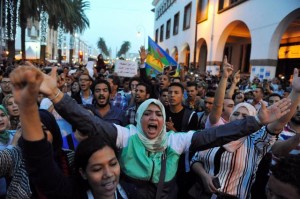Reuters
TOP NEWS
By Aziz El Yaakoubi
Protests take part in a rally called by the February 20 Movement in Rabat after a fishmonger in the northern town of Al Hoceima was crushed to death inside a rubbish truck as he tried to retrieve fish confiscated by police October 30, 2016. (REUTERS/STRINGER)
Thousands of Moroccans took to the streets in a northern city on Monday protesting for the fourth day over the death of a fishmonger crushed in a garbage truck after a confrontation with police who confiscated his produce.
The death in Al Hoceima on Friday of Mouhcine Fikri has triggered one of the largest protests nationwide since 2011 when the February 20 movement organized demonstrations for democratic reform inspired by the Arab Spring uprisings across the region.
Large-scale protests are rare in Morocco, where the king still holds ultimate sway. Morocco calmed Arab Spring-style protests in 2011 with reforms, spending and tougher security while leaders in Tunisia, Egypt and Libya were swept from power.
A frenzy of angry postings on social media and protest chants have blamed the Makhzen, a term used to describe the royal establishment.
“Protests will continue until all the responsible for that crime are punished,” said Al-Houssine Lmrabet, one of the protests organizers. “We also want guarantees that this will not happen again. This should start by cleaning the public administration of corrupted people.”
ADVERTISEMENT
Fikri’s death parallels how Tunisia’s uprising began in 2011, triggering revolts across the region, after a young man set himself on fire in desperation because police confiscated fruit and vegetables he was selling.
Morocco’s protests erupted at a sensitive moment as the kingdom prepares to host the 2016 United Nations climate change conference in November and the prime minister begins to form a coalition government after elections this month.
Smaller protests were also held on Monday evening in several other cities and towns including the capital Rabat, the eastern city of Oujda and the central town of Settat. High school students protested earlier on Monday in the northern town, activists said.
Authorities did not comment on the latest protests.
In an effort to calm tensions, King Mohamed, currently on a tour of Africa, ordered the interior minister to visit the victim’s family and present royal condolences. The government also promised an investigation.
Mouhcine Fikri had fish confiscated by police on Friday after he bought it at the port. Local authorities have banned swordfish fishing and sales in this season.
According to local media and authorities, Fikri jumped inside the trash truck that police used to destroy the confiscated fish in a desperate attempt to recover it and he was caught inside the crusher.
Activists accused police officers of ordering garbage men to crush Fikri, but the Moroccan police (DGSN) denied those accusations in a statement on Sunday.
Moroccan authorities heavily police protests, nervous over popular unrest since the 2011 protests. During those protests the king devolved some of his authority to an elected government in a constitutional reform.
(Editing by Patrick Markey and James Dalgleish)








